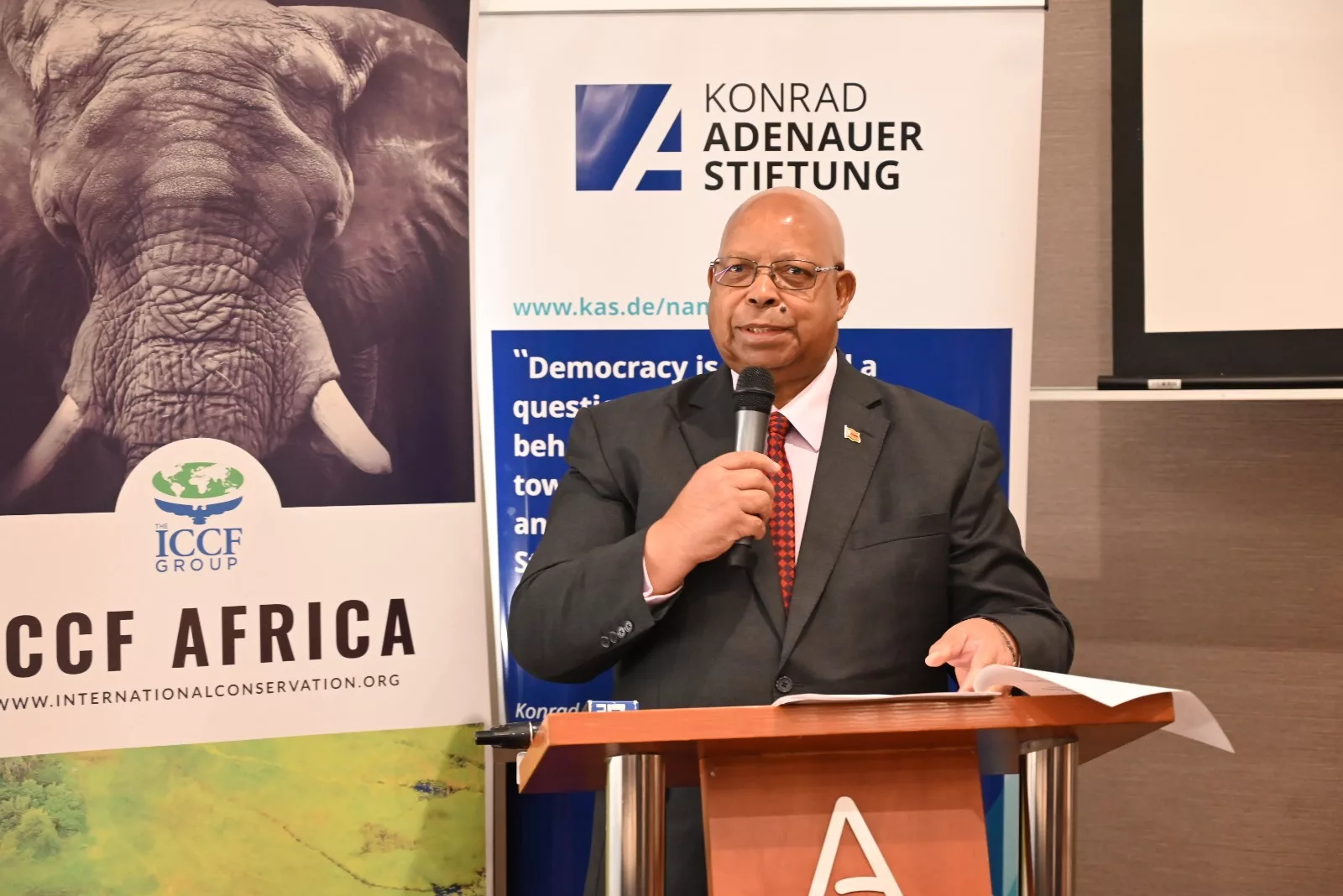|
Getting your Trinity Audio player ready...
|
Speaker of the Parliament of Zimbabwe, Hon Jacob F. N. Mudenda delivered a well-received and highly impactful keynote address at the Conference on “Fostering Sustainable Futures: Integrating Climate Resilience in Southern Africa,” at the Avani Windhoek Hotel, Namibia, where he urged Southern African nations to develop sound strategies for climate action.
This meeting is being attended by Rt. Hon. Peter Katjavivi, Speaker of the National Assembly of Namibia, Hon. Lukas Muha, Chairperson of the National Council of Namibia, Hon. Heather Sibungo, Deputy Minister of the Ministry of Environment, Forestry and Tourism (MEFT); Members of Parliament from the SADC Region; Ms. Boemo Segkoma, Secretary- General of the SADC-PF and Dr. Thorsten Hutter, the Germany Ambassador to Namibia. Experts on environmental issues attended the conference and included, Anja Berreta, Head of the Regional Programme Energy Security and Climate Change in Sub-Saharan Africa, (KAS), and Jane Olwoch, Executive Director of the Southern Africa Science Service Center for Climate Change and Adaptive Land Management (SASSCAL) Jill Barasa, Africa Programme Director, International Conservation Caucus Foundation.
Underscoring the theme’s criticality, Speaker Mudenda emphasized the need for Southern African nations to develop sound strategies for climate action, recognizing humanity’s dual role as both subject and object of the climate change challenges. He noted that several SADC countries have embedded environmental conservation as a fundamental human right in their Constitutions, underlining the necessity of robust legislation to bring these constitutional principles to life. Members of Parliament, he stressed, must be fully equipped to understand and advocate for environmental conservation, which can be facilitated by forming and strengthening Parliamentary Conservation Caucuses.
The Speaker also stressed the pivotal imperative of engaging communities and the private sector, ensuring they become active stakeholders and stockholders in environmental conservation. Speaker Mudenda called for climate action legislation to permeate all sectors of the economy, citing Zimbabwe’s innovative response with the Climate Change Management Bill, which includes instructive principles for climate action. Furthermore, he emphasized the need for robust climate action, including the crafting of cutting-edge legislative frameworks and the application of digital technologies in adaptation and mitigation initiatives.
Furthermore, Speaker Mudenda emphasized the imperative employment of Artificial Intelligence (AI) in climate action strategies to provide predictive analytics on climate patterns, optimize resource management, and facilitate real-time monitoring of environmental changes and climate change exigencies. Artificial Intelligence application enables swift decision-making crucial for climate resilience. Added to this, tertiary institutions, such as the Mohamed bin Zayed University of Artificial Intelligence in the UAE and Riga University in Finland, can be used as benchmarks for the integrated use of AI, especially as they are repositories and incubators of Machine Intelligence. Such collaborations are vital for achieving the sustainable futures envisaged by the Paris Agreement, particularly in fostering climate resilience in Southern Africa.
Echoing Robert Swan’s poignant reminder that “the greatest threat to our planet is the belief that someone else will save it,” the urgent call to climate action is clear, act now to prevent devastating impacts. A sustainable future for Southern Africa necessitates a holistic, collaborative approach prioritizing climate resilience, ecosystem preservation, and robust legal frameworks.
By uniting all sectors and stakeholders, he stressed, environmental ecosystems will thrive, green economies will grow and communities shall prosper, thus unlocking the region’s potential to thrive amidst climate change challenges, Speaker Mudenda concluded. Speaker Katjavivi of Namibia emphasized that Parliaments must amplify the voices of the vulnerable and ensure the crafting of policies that reflect their needs. He highlighted that the conference offers an opportunity for regional collaboration and sharing of best practices.
By working together, efforts can be bolstered to achieve a greater impact on climate action. The Deputy Minister of Environment, Forestry, and Tourism, Hon. Sibugo, called for an integrated approach where a scientific understanding of climate impacts must result in the development of inclusive and equitable adaptive strategies.
Jane Olwoch, Executive Director of Southern African Science Service Centre for Climate Change and Adaptive Land Management (SASSCAL), quoted the impactful assertion from the First report of the Intergovernmental Panel on Climate Change published in 1990, that the “Extreme weather undermines socioeconomic development. The cost of climate inaction is higher than the cost of climate action”.
Mr. Nesbert Samu, anchoring the Zimbabwean perspective, implored the need to strengthen legislative oversight and representation to ensure that Parliaments contribute to policies that build resilience in early warning systems and disaster risk reduction.
Later on in the day, participants visited the Namibian Association of CB RM Support Organisations (NACSO) complex, where they learned about community initiatives supporting sustainable natural resource management in Namibia. The visit included an interactive session exploring strategies for engaging local communities in conservation and sustainable development. At the end of the visit, participants were treated to sumptuous Namibian African flavoured cuisine.
The high-level conference will continue with deliberations on the Extractive Industries and Environmental Oversight, highlighting the cardinal role of governance and that of Parliamentarians in promoting sustainability as well as advancing transparency in the extractive industries.






